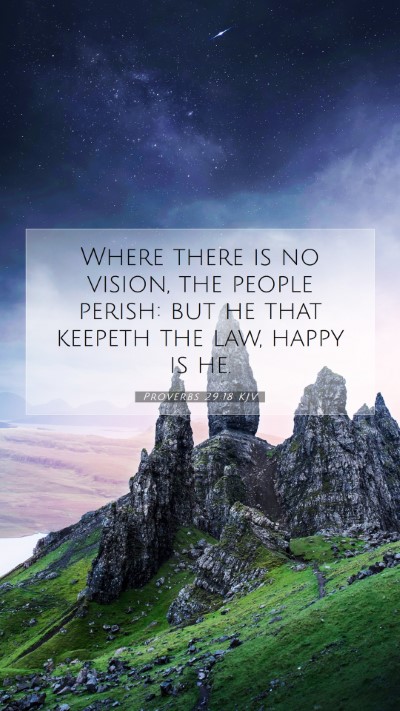Proverbs 29:18 states: "Where there is no vision, the people perish: but he that keepeth the law, happy is he." This verse conveys profound biblical principles regarding guidance, leadership, and the importance of divine direction in the lives of individuals and communities.
In this discussion, we will explore the bible verse meanings, bible verse interpretations, and bible verse explanations from notable public domain commentaries, including those by Matthew Henry, Albert Barnes, and Adam Clarke.
Understanding the Verse
The Hebrew term translated as "vision" incorporates both the idea of prophetic revelation and the broader concept of guidance. Matthew Henry notes that without divine guidance or prophetic insight, "the people perish" suggests a loss of direction and purpose. This indicates the necessity for spiritual leadership in society.
Albert Barnes amplifies this by emphasizing the role of leaders: “Where there is no vision, i.e., a want of proper guidance, a lack of divine truth, or a neglect of the divine law, the people are demoralized and disorganized." Thus, communities without clear, godly leadership face disorder and a lack of moral foundation.
Adam Clarke expounds on the latter part of the verse, explaining that "but he that keepeth the law, happy is he," refers to those who adhere to divine commandments. Such obedience fosters a sense of fulfillment and joy—denoting a clear relationship between law keeping and happiness.
Thematic Exploration
The themes presented in Proverbs 29:18 resonate deeply within the context of bible study insights and biblical exegesis. A lack of vision can lead to destructive consequences, while commitment to God’s law brings happiness and stability. This verse serves as a reminder of the essential role of divine instruction in personal and corporate ethics.
Key Insights from Commentaries
-
Matthew Henry's Commentary: Henry highlights the destructive nature of a lack of vision, likening it to a people wandering without purpose, hence emphasizing the importance of godly counsel and his law.
-
Albert Barnes: Barnes suggests that true joy arises from a commitment to divine rules, thus linking happiness to the observance of God’s law.
-
Adam Clarke: Clarke indicates that the law serves both as a guide and a source of happiness, reinforcing that those who follow it experience blessings and contentment.
Application and Relevance
Understanding Proverbs 29:18 can profoundly impact one's life and community. The principles derived from this passage can guide bible study groups and individuals alike. Engaging in online Bible study using this perspective offers opportunities for deeper reflection and practical applications.
Cross References
- Proverbs 16:29: "A man’s heart deviseth his way: but the Lord directeth his steps."
- Hosea 4:6: "My people are destroyed for lack of knowledge: because thou hast rejected knowledge, I will also reject thee..."
- Psalm 119:11: "Thy word have I hid in mine heart, that I might not sin against thee."
Conclusion
Proverbs 29:18 serves as a timely admonition about the necessity of vision and divine guidance in both personal lives and community governance. Through the interpretation of Bible verses, we realize that maintaining a relationship with God's law leads to profound peace and happiness. In conclusion, harnessing the insights from Scripture can guide us in navigating our spiritual journeys and enriching our understanding of biblical truths.


